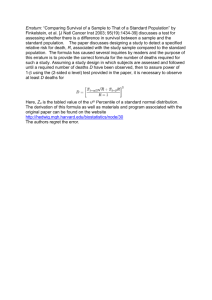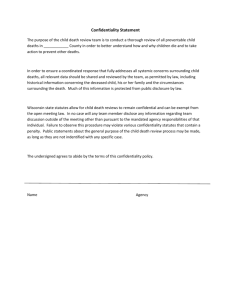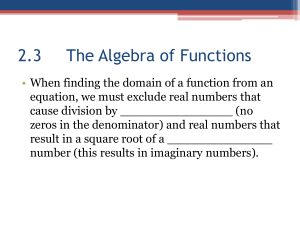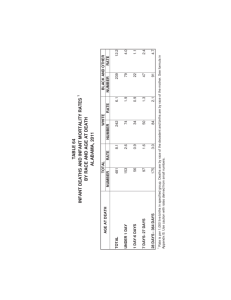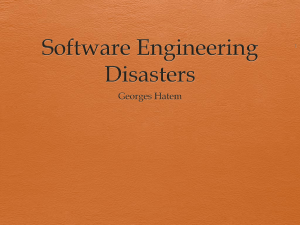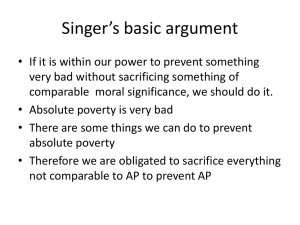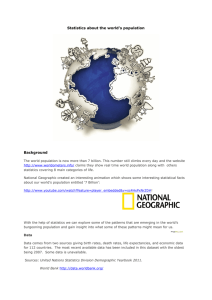Mary Jane the Outlaw: A fanatical pursuit By: Steven Watkins On a
advertisement
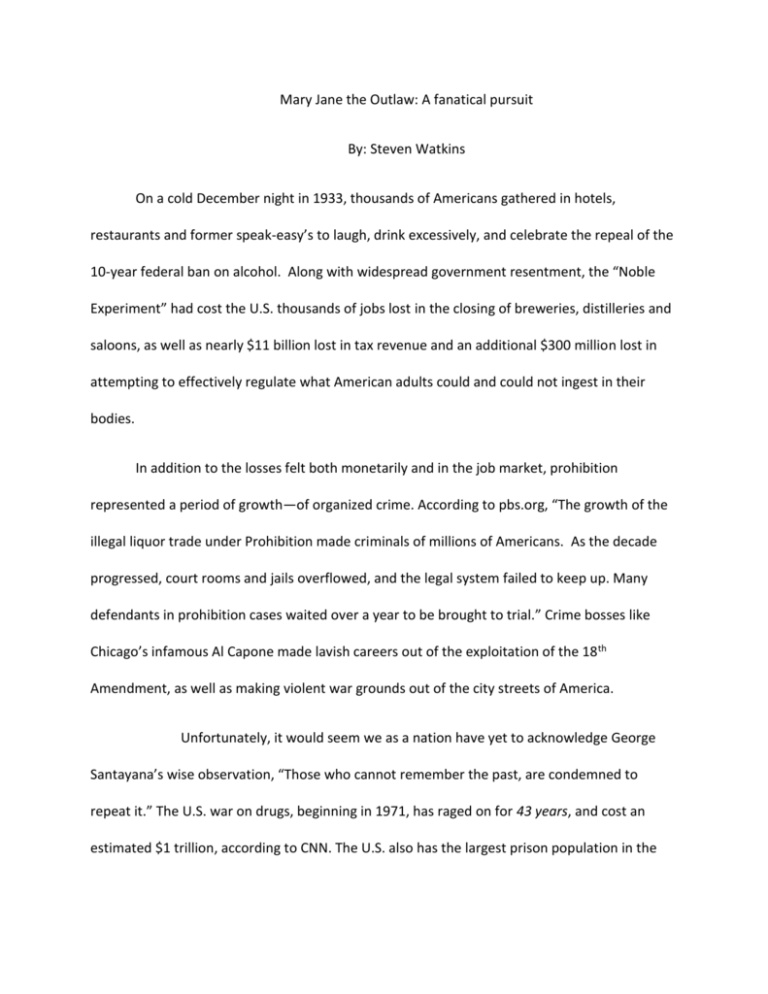
Mary Jane the Outlaw: A fanatical pursuit By: Steven Watkins On a cold December night in 1933, thousands of Americans gathered in hotels, restaurants and former speak-easy’s to laugh, drink excessively, and celebrate the repeal of the 10-year federal ban on alcohol. Along with widespread government resentment, the “Noble Experiment” had cost the U.S. thousands of jobs lost in the closing of breweries, distilleries and saloons, as well as nearly $11 billion lost in tax revenue and an additional $300 million lost in attempting to effectively regulate what American adults could and could not ingest in their bodies. In addition to the losses felt both monetarily and in the job market, prohibition represented a period of growth—of organized crime. According to pbs.org, “The growth of the illegal liquor trade under Prohibition made criminals of millions of Americans. As the decade progressed, court rooms and jails overflowed, and the legal system failed to keep up. Many defendants in prohibition cases waited over a year to be brought to trial.” Crime bosses like Chicago’s infamous Al Capone made lavish careers out of the exploitation of the 18 th Amendment, as well as making violent war grounds out of the city streets of America. Unfortunately, it would seem we as a nation have yet to acknowledge George Santayana’s wise observation, “Those who cannot remember the past, are condemned to repeat it.” The U.S. war on drugs, beginning in 1971, has raged on for 43 years, and cost an estimated $1 trillion, according to CNN. The U.S. also has the largest prison population in the world, with more than 2.3 million people serving time and more than half of them for drugrelated charges. Based on the FBI Uniform Crimes Report, over 8 million marijuana-related arrests have occurred in the U.S. since 1993, 88% of them for possession. Put simply, over 7 million people have been arrested in the U.S. since 1993, not for assault, not for murder, not for arson or even speeding, but for the possession of a little green plant. One would think, that based upon the astronomical expenses and the lives lost waging the 43-year-old struggle that such efforts must be made in pursuit of a substance dangerous enough to America’s citizens to warrant such fanatical practices. One would be catastrophically wrong. How dangerous is the little green culprit? Let’s compare it to some of its legal cousins. According to drugwarfacts.org, roughly 25,692 Americans die annually from alcohol-related causes. This category includes deaths from dependent and nondependent use of alcohol, and also includes deaths from accidental poisoning by alcohol. It does not include the nearly ten thousand additional deaths that occur each year from drunk driving. According to the Centers for Disease Control and Prevention, cigarette smoking accounts for more than 440,000 deaths in the United States each year. This figure does not include the nearly 40,000 estimated deaths from second hand smoke. Finally, according to drugwarfacts.org, roughly 22,124 deaths occur in the U.S. each year due to pharmaceutical drugs. All together, that’s more than 538,000 American deaths per year due to one of these three legal substances. Now let’s compare those figures to marijuana use. The math is simple. It does not require any advanced calculation, or even any thinking. To this date, no known cases of marijuana overdose exist on any public record. The United States, according to drugpolicy.org, spends an average $51 billion and arrests more than 658 thousand of its citizens to prevent the usage of a drug that is not only proven to be infinitely safer than other controlled legal substances, it’s actually used for medicinal purposes in 20 states. Prohibition? More like lunacy. One of the founding principles of American idealism is the ability of free citizens to make free choices--to pursue life, liberty and happiness. Determining what American citizens can and cannot put in their bodies is un-American. When those senseless regulations pertain to a substance that is not only proven safe, but medically-beneficial to some and deemed unjustly prohibited by many, it is downright unconstitutional. When billions of dollars are spent in the unconstitutional pursuit of that substance and of those who chose, as American adults, to make use of it, it is fanatical.
